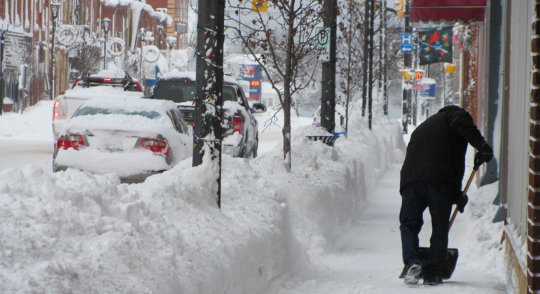Stephen Vance, Staff
Meaford councillors were given an education session focused on municipal winter road control practices prior to their February 1 council meeting.
The session was quickly organized after councillors had expressed questions at the January 18 meeting about the procedures followed by the roads department, particularly with this winter season subject to some experimentation in an effort to find potential efficiencies and cost savings.
Meaford Treasurer and Director of Infrastructure Management, Darcy Chapman, along with Superintendent of Transportation Services Phil Taylor, provided an in-depth snapshot of what goes into maintaining Meaford’s roads in the winter months.
Chapman walked councillors through the various policies and procedures adhered to by the roads department, explained road classifications, and the clickable map available on the municipal website that can offer information for councillors and residents.
Councillor Tony Bell had pressed Chapman at the January 18 meeting for a phone number he could contact at any time of the day or night should he have concerns or questions about a specific snow event, or to report issues. During the education session, Bell tried again.
“One of my initial questions of course, was about contact,” said Bell, who noted the general contact information published on public documents related to winter road control. “So that’s for the general ratepayer,” said Bell, who then held up a sheet of paper containing municipal contacts. “Fellow councillors, do you remember receiving this in December of 2014? This was a contact list that we were all given. There are six numbers in the Transportation department that I personally had access to. Over the course of that winter, I actually utilized three of them.”
Bell described one incident when at 4:30 in the morning he came upon a downed tree partially blocking a roadway.
“I couldn’t even use my chain to drag it with my truck, it was too huge,” said Bell. “Right below a hill, public safety, 4:30 in the morning, I called. The conversation? Where it’s at. The conversation? Thanks a lot, Tony, we’ll take care of that right now, have a good day. Over and done, information exchanged. That’s what I did, that’s how it was received, it didn’t occupy a lot of time, but it was something for public safety that I acted on. So all I’m asking is that if we (councillors) have contact with Patrol A, Patrol B. I didn’t abuse it, I used it when necessary.”
Chapman was blunt in his advice to Bell.
“I don’t disagree that if there’s a tree on the road – a very good example – and for that reason, that’s why we got rid of those numbers (on the councillor contact list). You shouldn’t have preferential treatment as a councillor to that number, nor should you need it. As I mentioned at the last meeting, if it is a matter of public safety, call 911,” suggested Chapman, adding that councillors needn’t be a middle-man in such situations: residents and councillors alike should contact 911, and emergency services will contact the municipality if needed.
It was also suggested to Chapman that an education session for councillors should have been held prior to the start of planned experiments with winter road control service delivery.
“This entire presentation with the exception of the one slide about sidewalk maintenance is a conglomeration of presentations that were provided to council on July 27, October 13, and December 14. So you’ve seen all this information in different pieces. Phil actually was the one who provided an hour-and-a-half long training session on all minimum maintenance standards back in July of last year,” noted Chapman.
Mayor Barb Clumpus conceded that the information had been previously provided to council, but noted that information can be overlooked or easily forgotten if not immediately relevant.
“While we probably have heard all of this information many times before, sometimes it takes the immediacy of the situation to bring it home,” suggested Clumpus.
At the conclusion of the training session Chapman offered councillors the opportunity to ride along with a municipal snow plow driver so that members of council can have a more intimate understanding of how Meaford patrols and maintains winter roads.
“We want to extend an invitation to any member of council that wishes to experience winter control initiatives first hand, and in person,” offered Chapman. The catch? “I should advise you that if you want to take advantage of this, just like our staff, you will be advised at about 2:00 in the morning by way of a phone call from the patrol person.”
Councillor Tony Bell provided a moment of levity in response to the invitation.
“Mr. Chapman, at my age, getting up at 2:00 in the morning is not a problem,” suggested Bell, bringing laughter around the council table.
As the session came to an end, Chapman stressed the importance of receiving feedback from the community on winter road control services both positive and negative.
“If you (the public) have a concern or a comment whether it’s good or bad, please voice it. The reason we’ve tried to create as many different avenues of feedback is that if we don’t get feedback, then I’m going to bring back information to council in May that is purely based on the financial data set, so we need the input from the public in order to understand the social side of things so we can say, ‘yes we can make this change, and sure it will save X number of dollars, but it also might negatively affect the population because we’ve heard these comments’, so we’re looking for as much feedback as possible over the next few months,” explained Chapman.












